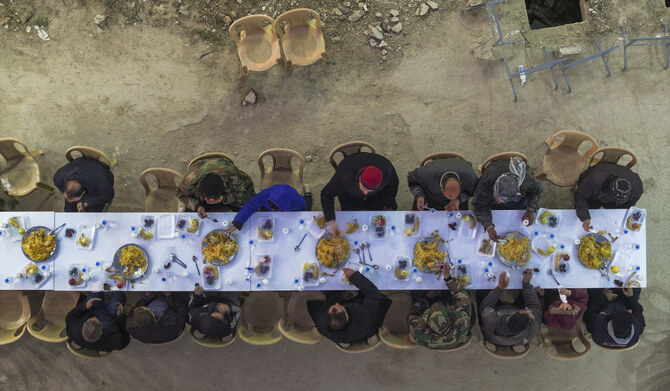PARIS: Israel’s foes vowed revenge on Saturday after Iran-backed Lebanese militant group Hezbollah announced its longtime leader Hassan Nasrallah was killed in an Israeli air strike on a suburb of Beirut.
Several world powers also warned of the killing’s potential repercussions, as the spectre of all-out war looms over the Middle East.
United Nations chief Antonio Guterres said he was “gravely concerned by the dramatic escalation of events in Beirut in the last 24 hours.”
Palestinian militant group Hamas, whose unprecedented October 7 attack on Israel sparked the devastating war in Gaza that drew in fellow Iran-backed groups including Hezbollah, called Nasrallah’s killing “a cowardly terrorist act.”\
“We condemn in the strongest terms this barbaric Zionist aggression and targeting of residential buildings,” Hamas said in a statement.
Palestinian president Mahmud Abbas offered his “deep condolences” to Lebanon for the deaths of Nasrallah and civilians, who “fell as a result of the brutal Israeli aggression,” according to a statement from his office.
First Vice President Mohammad Reza Aref warned Israel that Nasrallah’s death would “bring about their destruction,” Iran’s ISNA news agency quoted him as saying.
The foreign ministry of Iran, which finances and arms Hezbollah, said Nasrallah’s work will continue after his death. “His sacred goal will be realized in the liberation of Quds (Jerusalem), God willing,” spokesman Nasser Kanani posted on X.
Supreme leader Ayatollah Ali Khamenei announced five days of public mourning.

Iranians protest in Tehran's Palestine Square on September 28, 2024, after the Iran-backed Lebanese Hezbollah group confirmed reports of the killing of its leader Hassan Nasrallah in an Israeli air strike in Beirut the previous day. (AFP)
Russia’s foreign ministry said “we decisively condemn the latest political murder carried out by Israel” and urged it to “immediately cease military action” in Lebanon.
Israel would “bear full responsibility” for the “tragic” consequences the killing could bring to the region, the ministry added in a statement.
The Iran-backed Yemeni rebels, who have been firing on ships in the Red Sea in solidarity with Hamas, said in a statement that Nasrallah’s killing “will increase the flame of sacrifice, the heat of enthusiasm, the strength of resolve” against Israel, with their leader vowing Nasrallah’s death “will not be in vain.”
Turkish President Recep Tayyip Erdogan, whose country maintains diplomatic relations with Israel but who has been a sharp critic of its offensive in Gaza, said on X that Lebanon was being subjected to a “genocide,” without referring directly to Nasrallah.
In a post on X, Cuban President Miguel Diaz-Canel called the killing a “cowardly targeted assassination” that “seriously threatens regional and global peace and security, for which Israel bears full responsibility with the complicity of the United States.”

Greek Catholic Archmandrite Abdullah Yulio (C-R) join marchers in the city of Ramallah in the occupied West Bank on September 28, 2024, to protest the killing of Hassan Nasrallah in an Israeli air strike in Beirut the previous day. (AFP)
Mixed reactions from allies
As expected, US leaders welcomed Nasrallah's demise, with President Joe Biden calling it “a measure of justice for his many victims, including thousands of Americans, Israelis and Lebanese civilians.”
Washington supports Israel’s right to defend itself against “Iranian-supported terrorist groups” and the “defense posture” of US forces in the region would be “further enhanced,” Biden added in a statement.
Vice President Kamala Harris said Nasrallah was “a terrorist with American blood on his hands” and said she would “always support Israel’s right to defend itself against Iran and Iran-backed terrorist groups such as Hezbollah, Hamas, and the Houthis.”
Leading Republicans in the House of Representatives also welcomed the end of a “reign of bloodshed, oppression, and terror” by “one of the most brutal terrorists on the planet.”
Canadian Prime Minister Justin Trudeau described Nasrallah as “the leader of a terrorist organization that attacked and killed innocent civilians, causing immense suffering across the region.” But he called for more to be done to protect civilians in the conflict, adding: “We urge calm and restraint during this critical time.”
Argentine President Javier Milei reposted on X a message from a member of his council of economic advisers, David Epstein, who hailed the killing.
“Israel eliminated one of the greatest contemporary murderers. Responsible, among others, for the cowardly attacks in #ARG,” it said. “Today the world is a little freer.”
Other allies of Israel sang a different tune.
German Foreign Minister Annalena Baerbock told ARD television that the killing “threatens destabilization for the whole of Lebanon,” which “is in no way in Israel’s security interest.”
UK Foreign Secretary David Lammy said in a post on X that he had spoken with the Lebanese premier.
“We agreed on the need for an immediate ceasefire to bring an end to the bloodshed. A diplomatic solution is the only way to restore security and stability for the Lebanese and Israeli people,” he said.
French Foreign Minister Jean-Noel Barrot demanded Israel “immediately stop its strikes in Lebanon” and said it was opposed to any ground operation in the country.
France also “calls on other actors, notably Hezbollah and Iran, to abstain from any action that could lead to additional destabilization and regional conflagration,” the foreign ministry said in a statement.




























